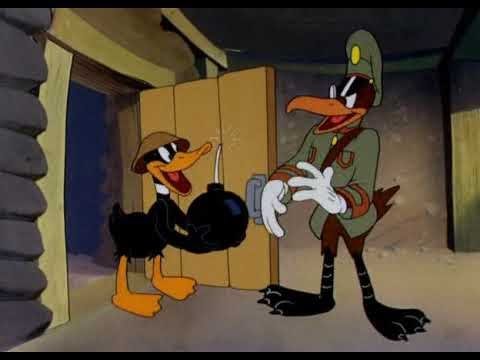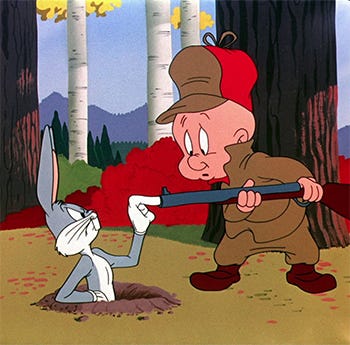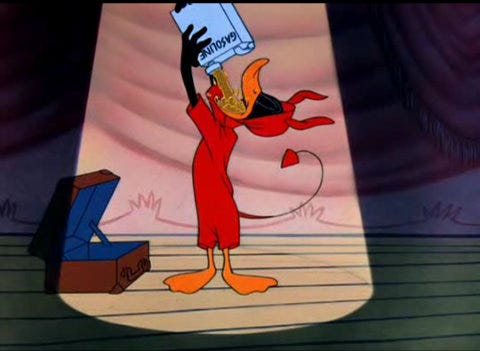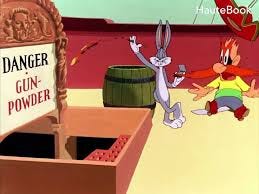Last weekend the family and I went to see The Day the Earth Blew Up: A Looney Tunes Movie. As corporate IP goes, there’s little I prefer to classic Warner Brothers animation, with its sharp craftsmanship and unsentimental mayhem. These characters, with their sophisticated slapstick, have been my uninterrupted companions from the sunlit Saturday mornings of my earliest childhood through the pseudointellectual aeries of my college years all the way into the thorny, tangled forest of middle age - a lifelong love I gratefully share with my wife and child. So when the opportunity arose to support the franchise in an actual, physical cinema (without the unnecessary distraction of human actors and basketball plotlines), we jumped at the chance.
The movie is a lot of fun! It’s a full-length sci-fi comedy starring Porky Pig and an early-period Daffy Duck (when he was still more psychotic than sarcastic) as adopted brothers who avert an alien invasion conducted via tainted chewing gum. It’s fast, silly, and frivolous, very much in the style of the new Looney Tunes Cartoons that debuted a few years ago on the Warner Brothers streaming service, HBO Max. These latter-day throwbacks don’t quite stand up to the canonical mid-century shorts, but how could they? They’re a loving, respectable homage, which is a magnitude better than previous reboots.
Still, for all our enjoyment, the flick didn’t quite live up to its status as the first-ever fully animated full-length Looney Tunes film to play in theaters. But there’s a very clear reason: It wasn’t supposed to be. The film was created for broadcast on the Cartoon Network and Max (which dumped the “HBO” in 2023) before it was unceremoniously dumped into limbo by Warner Brothers. It was picked up for distribution last year by Ketchup Entertainment, which decided to bring it to theaters for wider exposure. It’s a happy ending for Looney Tunes fans like myself, but grimly reflective of larger trends.
In 2023, Warner Brothers axed another fully completed Looney Tunes film, the live-action hybrid Coyote Vs. Acme, strictly for a tax write-off. (This week it too was saved from oblivion by Ketchup, which will release it in theaters next year.) Last month, all of the hundreds of original Looney Tunes shorts from the 1930s-50s were abruptly removed from Max, making them unavailable to view legally online - with no reason given. Adding insult to injury, Warners announced last week that it’s tearing down the 70-year-old studio building where many of those cartoons were created.
Why does Warner Brothers seem to hate the Looney Tunes, a franchise which is synonymous with the studio for thousands of fans?
This Indiewire article offers some excellent speculation on some of the reasons Warner Brothers CEO David Zaslav seems to have a vendetta against these characters: He doesn’t get it, he’s focused on other properties, they’re a casualty of the turn away from 2-D animation. The way I see it, all of these are different expressions of a single root cause: The company believes Looney Tunes is out of step with the times. This is a pretty frequent complaint about legacy properties that stand the test of time more as icons than as the living, breathing subject of entertaining stories. It’s not hard to name recognizable characters that don’t appear in cartoons anymore: Popeye, Felix the Cat, Mister Magoo, Mighty Mouse, Yogi Bear, Rocky and Bullwinkle... Just look at how much Disney has struggled to make Mickey Mouse relevant over the years.
But I’m going to take this a step further and say that it’s not just a matter of faded glory. The latest reboots are promising, and watching the classic shorts on Blu-Ray proves them to be fresher and more exciting than ever. No, I think the real problem is that Looney Tunes is simply incompatible with the politics and aesthetics of fascism.
In true Looney Tunes fashion, I’m going to approach this thesis diagonally. When Trump won the 2016 election, I was taking an illustration class with the great Steve Brodner. Many of our conversations explored the role of comedy and satire in an era where those functions had been adopted by the enemy. You can’t fight Trump with humor, someone argued, because Trump himself is Groucho Marx, subverting a slow-moving system by being faster, funnier, and more mischievous than his rivals.
As it’s turned out - TWICE - any touch of Groucho in Trump’s campaigning curdled into dead-eyed self-seriousness the second he took office. You can’t be the underdog after you’ve won, and so the trickster gives way to the strongman. All the (highly questionable) tactics he used to gain that sympathetic collegiality with voters became liabilities as soon as he changed his focus to projecting strength. The jeering Republican minions may fancy themselves a bunch of cutups, but their laughter is the laughter of bullies taking sadistic pleasure in pain and humiliation. The Marx Brothers may have been anarchic, but they were never cruel.
I believe the Looney Tunes, at their best, have an even clearer moral compass. While the Bugs and Road Runner were clearly influenced by Grouch and Harpo, etc., I’d argue that the humor of their cartoons is, counterintuitively, a bit more grounded in reality. The Marxes are the gleeful extension of a vaudevillian anything-goes sensibility, spiked with naïve slugs of dada and surrealism - an act honed through decades on the stage and translated into the entirely artificial milieu of filmed studio comedy. The Warner animations, by contrast, were created a few years later to entertain Depression-whomped masses from sea to shining sea with fantasies of empowerment. There’s an implicit social conscience in the best Looney Tunes shorts that stems from the resilience and ingenuity that Americans were attempting to harness as they roused themselves out of the economic depths and into the chaos of a century-defining war - a sensibility that flavored the cartoons well into the post-war years.
The whole Looney Tunes gestalt always favors the outsider, the upstart, the small potato: Tweety over Sylvester. Road Runner over the Coyote. The aggressors can be relatable, sure, but that doesn’t mean they should win. They’re literal predators! A society of people struggling to put food on the table doesn’t root for the guy with the gun, they root for the rabbit who’s wily enough to defend himself against the odds. Bugs Bunny is our truest populist, in the best sense of the term. He represents all of us who fear having our homes dug up by an unwelcome steam shovel, who just want to hang out chewing carrots and playing our banjo without getting shot at. He doesn’t ask for trouble - but when it comes to his doorstep, he’s ready to defy the laws of physics to defend his turf.
On a certain level, it’s possible to imagine this don’t-tread-on-me sensibility appealing to the MAGA ragers. After all, they see themselves as rugged individualists, holdouts against the irrevocable forces of pompous elites, holding off societal decay with only their wits and moxie. But the parallels are skin-deep. Fascism may prey on the anxieties of a perceived defenselessness, but it wants you to feel like a predator even as it removes your teeth. It requires constantly whipping its constituents into a blind rage, whereas Bugs keeps his cool. He does what needs to be done, but he knows the score and understands when to stop. Can you imagine him at the front row of a Trump rally, wearing a red hat and raging against immigrants? Absolutely not. But you can imagine him facing off against a grotesque caricature of those who do.
No, if MAGA is reflected anywhere in the Looney Tunes universe, it’s on the flip side of the heroes. Elmer Fudd, the armchair outdoorsman obsessed with firearms. Yosemite Sam, tantrum-thrower and imperialist thug. Or, perhaps most damning of all, late-period Daffy Duck. Not the hootin’, hollerin’ maniac of his earlier iteration, but the sarcastic, self-aggrandizing also-ran who can’t stand being upstaged by Bugs - the guy who keeps getting tripped up by “pronoun trouble,” who will do ANYTHING to get the respect he’s due, even if means guzzling a can of gasoline, swallowing a match, and blowing himself up to get it.
Of course, in the real world, that sort of behavior tends to blow up the entire theater and all of the audience along with it, which is a reminder that, as ridiculous as they might be, the Republicans who are currently destroying America are no joke. There’s nothing playful or joyful about their cruelty - they’re simply out to destroy. There’s no number of dead rabbits that will satisfy them.
When you’re the CEO of a major media corporation, you’re not exactly motivated to speak truth to power. And so it’s easy to see how these characters, and the philosophy they represent, can start to look like an embarrassment at best, or a target at worst. Better to focus on fascist-friendly properties like the billionaire with cool tech who dresses like a bat in order to punch riff-raff - an oligarch-friendly character who distracts from any discussion of a social safety net with displays of maximum brutality. (And look, I LIKE Batman - I just think we need to be honest about what he represents.)
I am patently aware of how silly it seems to take such a strong stand on behalf of cartoons. But if we don’t take seriously the things we love, what does it mean to love them? I believe fun is a virtue, and in the end, the cartoons are incredibly FUN in their implicit denunciations and perversions of an unjust world. They were the work of a serendipitous assemblage of outstanding artists and craftsmen, who devoted tremendous amounts of time and attention to exploring the sublimity of imaginative conflict. Fascists only understand one form of fun, and it is the stomping of the boot - preferably on the softest surface imaginable. Looney Tunes take great pleasure in the fantasy of what would happen if that soft surface was capable of fighting back.
This tough-as-nails dynamic reflects their genesis as entertainment for weary adults - yet their avowed status as “kid’s stuff” is a convenient excuse to brush them under the carpet. Make no mistake, these cartoons are not gentle flirtations with kitsch, as with even the most aggressive Disney cartoons (and again, I LIKE Disney) - yet their dismissal as kids’ stuff is used as a paradoxical reason for their removal. As The Decider wrote about their disappearance from Max:
The nonsensical rationale for losing the shorts was that their current strategy emphasizes “adult and family programming,” the implication being the Looney Tunes shorts are “children’s programming.” Not only is this a confusing family-but-not-children’s designation for a service that still runs something literally called Baby Looney Tunes, it runs in direct opposition to the cartoons’ whole deal as precursors to stuff like The Simpsons: Animation produced with the assumption that both kids and adults will enjoy it.
Even if we grant it’s “just for kids,” it’s clearly not the kind of stuff the suits want kids to enjoy. One reason kids like Looney Tunes is the way it addresses their own stake as small fry in a world of imbalanced power. Fantasy and imagination - and what else to cartoons consist of? - are ways of finding our place and learning how to defend it. In this sense, smart grown-ups know that child’s play is anything but childish. In her essay “Do-It-Yourself Cosmology,” Ursula K. LeGuin writes:
People who are threatened by the imagination usually dismiss works of fantasy as “childish.” Though the dismissal is a confession of impotence, the description is exact. In the creation and preservation of fantasy worlds, the role of the child seems central… The politician, the profiteer, and the sensualist have no patience with the otherworldly.”
The Donald Trumps and David Zaslavs of this world want to serve us only the fantasies that shore up the rich and blame the little guys for all the world’s problems - and what could be a greater insult to the reality of childhood? Fascists and their enablers only acknowledge “childishness” as a synonym for an ersatz “innocence” that justifies screaming at scapegoats whenever that myth is disrupted (unless those children are Black or brown or living in a poor country, in which case they don’t count). The inherent rebelliousness and curiosity of children - or anyone who doesn’t subscribe to their program - is not something they want to encourage. How can they profit from that?
To say it for the thousandth time, I know art’s not going to save us - certainly not commercial art owned by massive corporations. But we can still take our cue from the best of the past. Keeping classic Looney Tunes in circulation shows a reality beyond the fascist pomp and grievance that keep the cowardly in line. Characters like Bugs and (early) Daffy and even the problematic Speedy Gonzalez can inspire us to throw a fistful of grit into the churning machine of fascism. Cory Booker’s 25-hour Senate filibuster this week was a Bugs Bunny-ass move. It’s only the barest beginning, but imagine an entire nation of clever citizens leveraging whatever small power we have to make it harder for the bullies to win by standing our ground and exhausting them with ingenious mischief.
I mean, the Looney Tunes characters went up against Hitler himself, for god’s sake! What more do we need to understand which side they’re on - and why some people think it’s good business to pretend that never happened?













Looney Tunes protagonists show us that the only fitting, inevitable response to corporate power and the demands of capital is insanity. Please pass the ketchup, I think I’ll go to bed!
Fucking fantastic article.